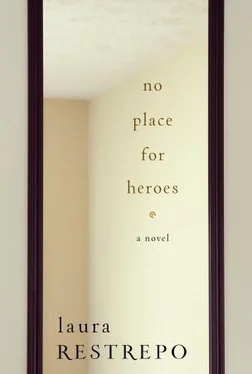Mamaíta, who as agreed upon the night before arrived at the hospital at six thirty, rested and ready and in flat shoes, so that she could remain by her side during the long, hard task of delivery, was caught by surprise by a nurse who was standing in a rectangle of sky against an open window, the baby wrapped in white cloth.
“It’s a beautiful boy,” she announced.
Now, two and a half years later, in that room in a half-empty apartment in the neighborhood of Palermo, Lorenza leaned back at last, around three in the morning. She did so with the deliberate purpose to rest awhile, to deal with what was waiting for her the next day, whatever it was, with her senses alert.
“From the other side of the door, I could hear the sound of the old movies your uncle Miche was watching on TV, one after the other,” she told Mateo.
He couldn’t sleep, either.
“Was he keeping an eye on you?”
“Maybe. The phone and the door were on his side, to make sure I remained incommunicado. I didn’t care, hadn’t really planned to communicate with anyone. Before seven in the morning, we were at Aeroparque Jorge Newbery and at eight were flying to San Carlos de Bariloche.”
Bariloche, of course, thought Lorenza. You might have guessed it, where else would they be if not in Bariloche, Ramón’s dream place, his refuge, his Utopia, but also a convenient spot for him and unfavorable for her, horribly difficult for executing any escape plan. Located in Andean Patagonia, near the tip of the continent, some two thousand kilometers from Tierra del Fuego and the antarctic circle, Bariloche was at that time a settlement area rather isolated from the rest of the world, a place she had never been and that he knew well from his work there as a guide for mountain excursions. During the flight, Miche kindly warned Lorenza that Mateo would not be at the airport, so she dampened any expectation and its consequent disappointment for this new landing.
Miche had in his pocket the keys to a white Chevrolet Impala that was there waiting for them. Without saying anything, they drove east, away from the town, which Lorenza inferred was a few kilometers from the Chilean border. She took advantage of the silence to engrave in her mind every name that appeared on the road: Lago Nahuel Huapi, Pioneers Road, Virgen de las Nieves, El Retorno Hostel.
Then they veered onto a road that led uphill to the cathedral, as indicated by the arrow at the crossing. The road narrowed and became steep without signs of any sort. About forty-five minutes after leaving the airport, they came upon a valley on the banks of another lake. Small log cabins peeked through the trees, a considerable distance from one another. If she had not been calculating how she was going to dash off to Chile, she would have had to acknowledge that this was one of the most beautiful corners of the planet. Miche stopped the Impala next to one of the huts. Lorenza got out and soon saw, approaching through the woods, coming down the mountain, riding an old horse, a man with a small child.

“IS THAT OFFER to go skiing still valid?” asked Mateo, apropos of nothing.
“You said you didn’t want to.”
“I didn’t want to before, I want to now.”
“Then say no more,” Lorenza replied, enthused. “Tomorrow is my last commitment. At noon, I’m free, and we’ll be in Bariloche by nightfall. How nice you changed your mind, kiddo. This is the best news. Can you imagine? We can stay five or six days, and up to eight if we get a little cabin at a good price, or a couple of rooms in a pretty hostel, there must be one that’s not too expensive, it’s not yet high season. We can rent clothes and equipment there, so that’ll be no problem.”
“Not with you, Lolé,” said Mateo gently, but it was as if someone had struck her on the head.
“Not with me?”
“I’d like to go, but without you.”
“What do you mean, without me?”
“I really want to go. But without you.”
“What about me? What do I do in the meantime?”
“You wait for me here in Buenos Aires.”
Mateo must have been saturated with the constant presence of his mother, with the irremediable absence of his father, with adult stories, with claustrophobic days of Dynasty Warriors, so much anxiety and so much twirling the lock on his forehead with his forefinger, listening to dramas of times gone by during the resistance. It was only natural for him to be tired of roaming between ghosts, and he deserved to have a good time outdoors, in the present, with people his own age. Lorenza understood, why wouldn’t she understand, it was perfectly understandable, and at the same time not so much. What happened to her eternal comrade? Why did he want to leave her behind? There was something there that was not entirely fair, and she too could use some air, some exercise. Mateo thought that her skiing was awful and he wasn’t wrong, but she still loved it. And Mateo knew it, knew how happy she was coming down the mountain, even if she fell and had to get up ten times. Also, she very often dreamed of snow, had a veritable obsession with snow, maybe because she was born in the tropics and up until sixteen years ago, when she had flown to meet him, had to be content with wintry landscapes from pictures on boxes of cookies and Christmas cards.
But how could she keep her son from going alone, if only the day before she would have loved to have been rid of him, seen him as independent and active, passionate about something, instead of holed up in his room, his neurons electrocuted by the PlayStation. So why did she feel diminished now, as if she’d gone from high heels to barefoot, and why would she not be able to enjoy those five days without Mateo? It was only five days and she had so many people to see in Buenos Aires, so many things to do, why be sad if, after all, she had not fallen from a train, or been thrown out of a party. Though maybe she had, a bit.
She’d wait for him at Gabriela’s house. She’d catch up with her old comrades, continuing to recover fragments of the old days. All right: she would stay and Mateo would go. And if the decision had been made, there was no time to lose, they had to find a winter camping site, or a ski school, so that he would be with a group and a good instructor.
“Then you’re not going to call Ramón?” She hadn’t wanted to say it, but she did, and was startled to realize she’d pulled one last trick out of her sleeve in order to keep him there.
Mateo ducked the question and did not respond. It was better that he didn’t. It was only fair that they surrender in this first effort to find his father. They had done enough and could one day return to continue the search. For now his thoughts were aimed at other things. First of all, he wanted a new backpack; he felt that the suitcase he’d brought was no good, the others on the trip would have backpacks, and he did not want to be the only one with an old-man suitcase.
“Think about it, Lolé. It doesn’t go with my personality.”
They bought a red backpack with many straps and compartments, which Mateo felt was more in tune with his personality, and Lorenza was pleased to see him so happy, delighted to see him excited about his own plans. Then they fought about a new pair of boots. She insisted on getting some boots suited for the snow but he refused to go along. He claimed that there was no need and that he didn’t even feel like trying them on, but she piled on her convincing arguments, so he gave up and they bought them. They went to several travel agencies to shop around and compare prices, made a second round, studied catalogs, looked at photos, and finally opted for a complete package, including airfare, accommodation, food, equipment rental, lessons, and a lift pass. They bought a pair of thermal gloves and again argued, this time about whether it would be necessary to get a warmer scarf. He won, and they didn’t buy a scarf. The next day, at eleven o’clock in the morning, they were at Aeroparque Jorge Newbery, looking for the place where Mateo was to meet his fellow travelers.
Читать дальше













